Unit 9 Learning Lesson1 Active Learning课(共32张PPT)件-2025-2026学年北师大版(2019)必修第三册
文档属性
| 名称 | Unit 9 Learning Lesson1 Active Learning课(共32张PPT)件-2025-2026学年北师大版(2019)必修第三册 |
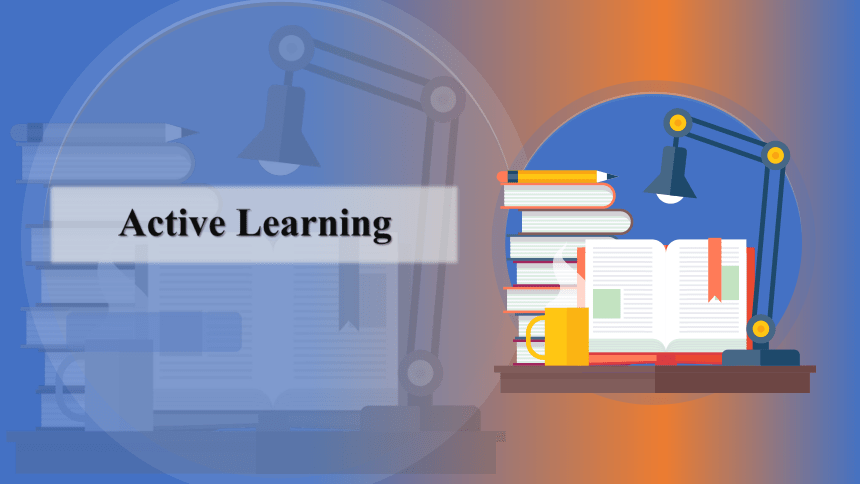
|
|
| 格式 | pptx | ||
| 文件大小 | 3.3MB | ||
| 资源类型 | 教案 | ||
| 版本资源 | 北师大版(2019) | ||
| 科目 | 英语 | ||
| 更新时间 | 2025-06-21 18:50:46 | ||
图片预览

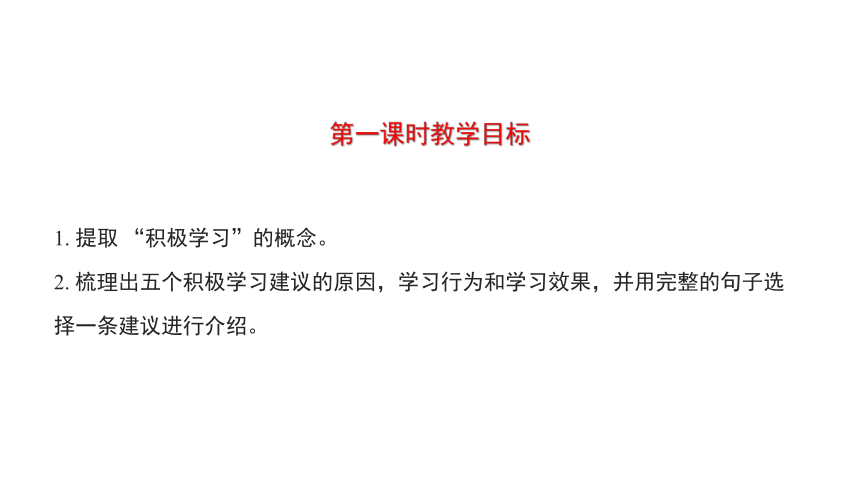
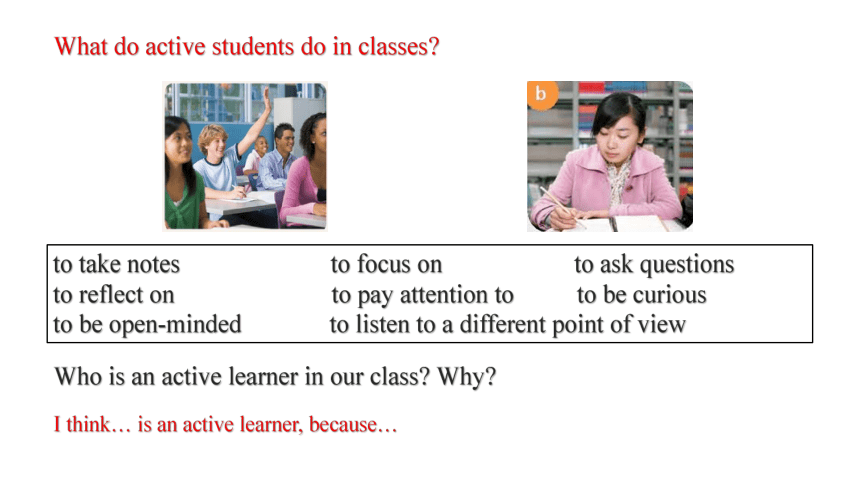
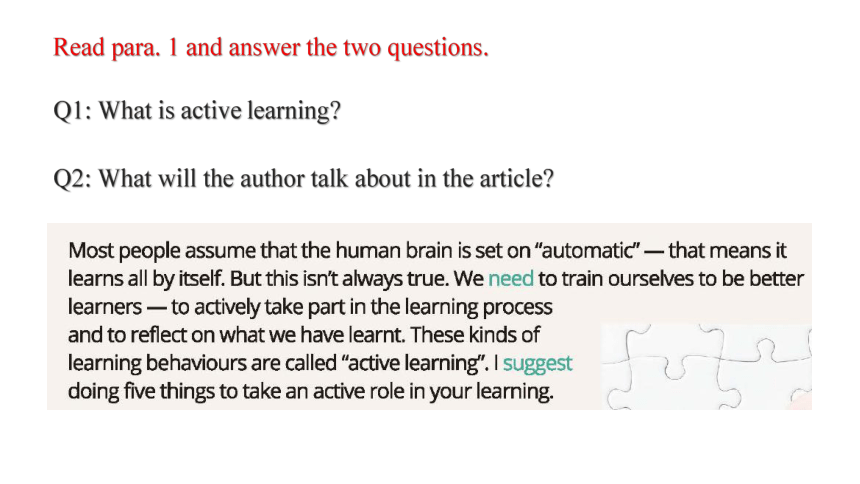
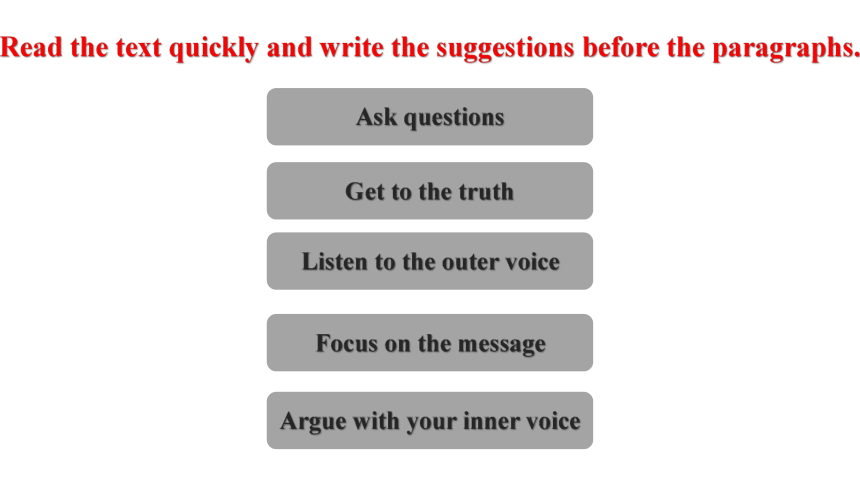
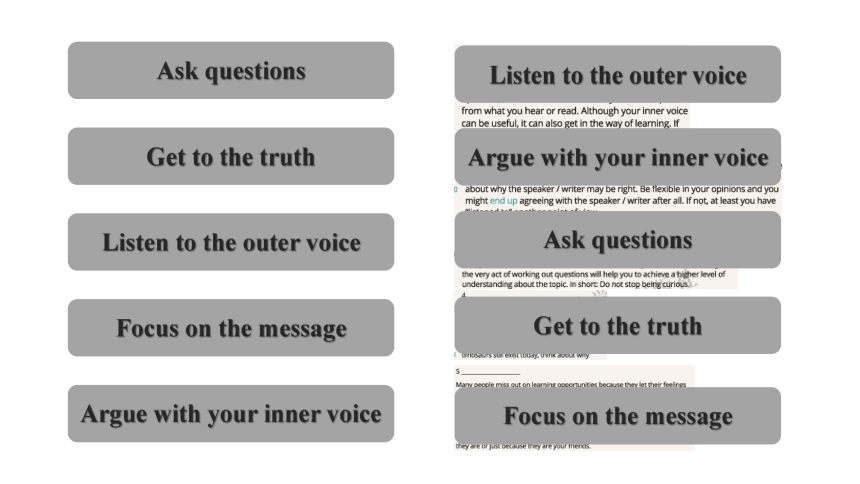
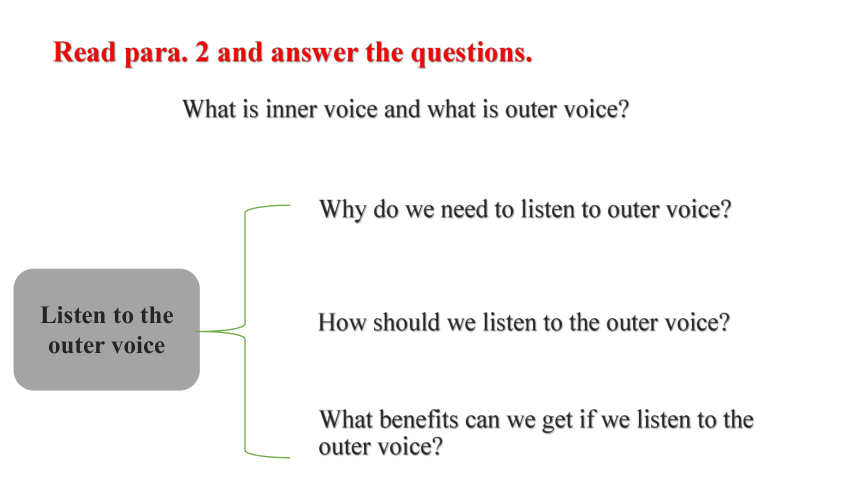
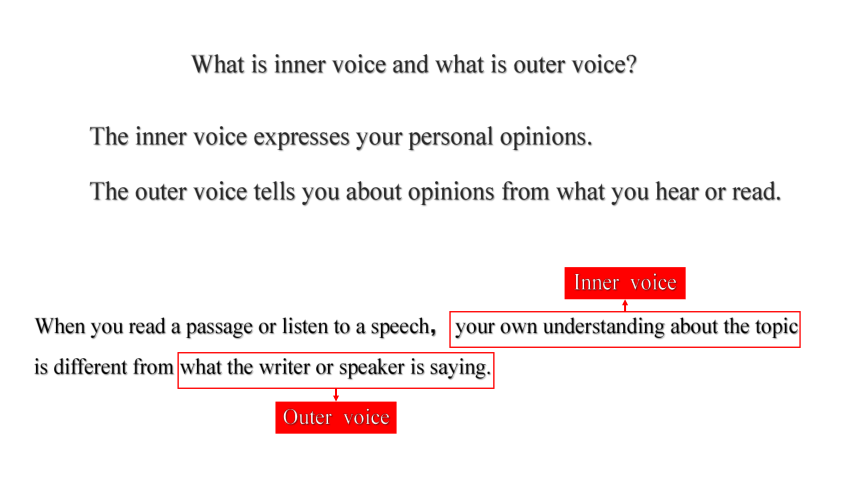
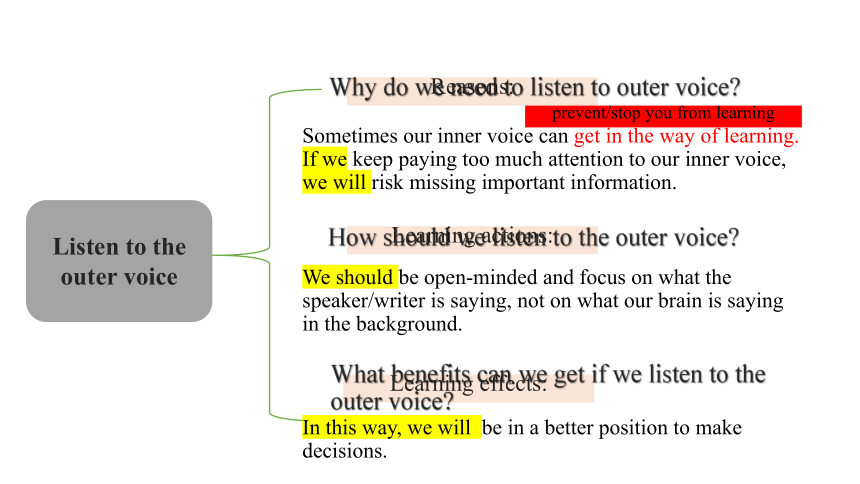
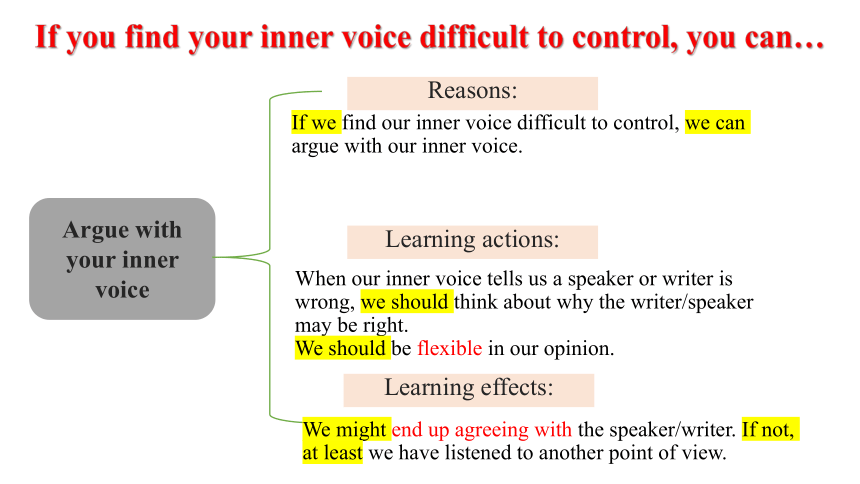
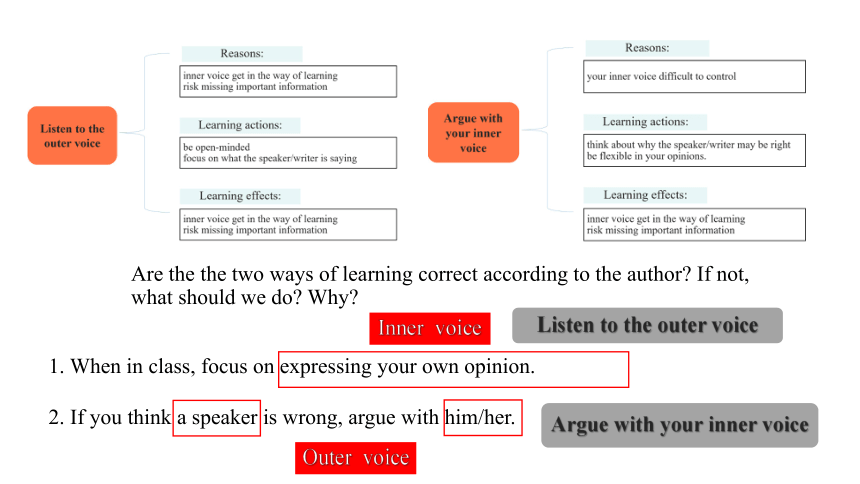
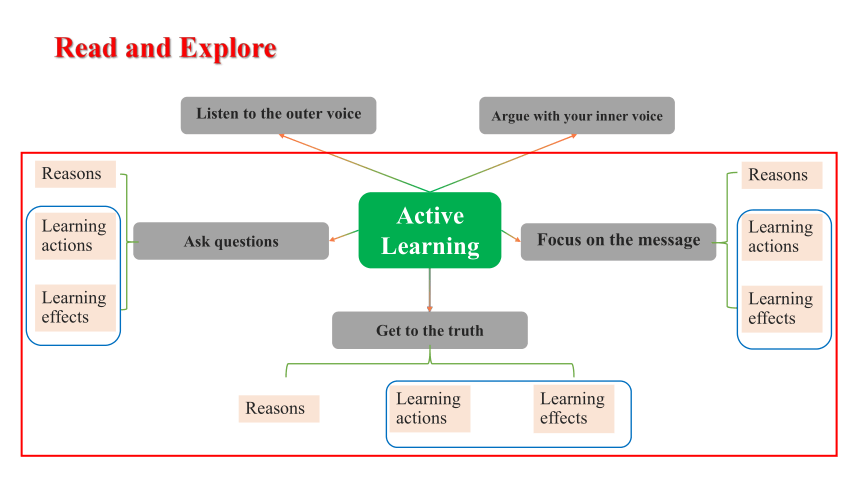
文档简介
(共32张PPT)
Active Learning
第一课时教学目标
1. 提取 “积极学习”的概念。
2. 梳理出五个积极学习建议的原因,学习行为和学习效果,并用完整的句子选择一条建议进行介绍。
What do active students do in classes
to take notes to focus on to ask questions
to reflect on to pay attention to to be curious
to be open-minded to listen to a different point of view
Who is an active learner in our class Why
I think… is an active learner, because…
Read para. 1 and answer the two questions.
Q2: What will the author talk about in the article
Q1: What is active learning
Ask questions
Get to the truth
Listen to the outer voice
Focus on the message
Argue with your inner voice
Read the text quickly and write the suggestions before the paragraphs.
Listen to the outer voice
Argue with your inner voice
Ask questions
Get to the truth
Focus on the message
Ask questions
Get to the truth
Listen to the outer voice
Focus on the message
Argue with your inner voice
Listen to the outer voice
Why do we need to listen to outer voice
How should we listen to the outer voice
What benefits can we get if we listen to the outer voice
Read para. 2 and answer the questions.
What is inner voice and what is outer voice
The inner voice expresses your personal opinions.
The outer voice tells you about opinions from what you hear or read.
When you read a passage or listen to a speech, your own understanding about the topic is different from what the writer or speaker is saying.
Inner voice
Outer voice
What is inner voice and what is outer voice
Listen to the outer voice
Reasons:
Learning actions:
Learning effects:
Why do we need to listen to outer voice
How should we listen to the outer voice
What benefits can we get if we listen to the outer voice
Sometimes our inner voice can get in the way of learning.
If we keep paying too much attention to our inner voice, we will risk missing important information.
We should be open-minded and focus on what the speaker/writer is saying, not on what our brain is saying in the background.
In this way, we will be in a better position to make decisions.
prevent/stop you from learning
Argue with your inner voice
Reasons:
Learning actions:
Learning effects:
If we find our inner voice difficult to control, we can argue with our inner voice.
When our inner voice tells us a speaker or writer is wrong, we should think about why the writer/speaker may be right.
We should be flexible in our opinion.
We might end up agreeing with the speaker/writer. If not, at least we have listened to another point of view.
If you find your inner voice difficult to control, you can…
1. When in class, focus on expressing your own opinion.
Are the the two ways of learning correct according to the author If not, what should we do Why
2. If you think a speaker is wrong, argue with him/her.
Inner voice
Listen to the outer voice
Outer voice
Argue with your inner voice
Active Learning
Listen to the outer voice
Argue with your inner voice
Ask questions
Reasons
Learning actions
Learning effects
Get to the truth
Focus on the message
Reasons
Learning actions
Learning effects
Read and Explore
Reasons
Learning actions
Learning effects
Ask questions
Reasons:
Learning actions:
Learning effects:
Because asking questions is the easiest way to promote active learning.
When we get information from someone, from books or the Internet, we should ask two, three, even five questions about the topic. Do not stop being curious.
The answers will lead us to further learning and the very act of working out questions will help us to achieve a higher level of understanding about the topic.
Get to the truth
Reasons:
Learning actions:
Learning effects:
Even when an idea sounds entirely unlikely, there may be an aspect of it that based on truth. For example, someone says that dinosaurs still exist today…
We should not accept everything we learnt. We should attempt to find the truth at the heart of each idea and think about why they believe this.
We will increase our chance of learning something.
Focus on the message
Reasons:
Learning actions:
Learning effects:
We may miss out on learning opportunities because we let our feelings get in the way.
We shouldn’t forget we can still learn from the people we don’t like and don’t judge people based on the first impressions or personal feelings.
We should separate the message from the messenger.
We will not miss out on learning opportunities.
For example, we refuse to learn or ignore what is said because we don’t like the speaker or writer.
Lily only engages in classes of her favourite teacher’s. When the students who she doesn’t like share opinions, she always ignores and even argues with them. Now she finds she is really behind in her study and she feels very anxious. What should Lily do Why
Introduce one suggestion
Express Yourself
Which of the suggestions in the text do you think is the most useful Why
How will you learn actively in the future
Homework
You pen pal Jim has difficulty in taking an active role in learning. Please offer at least three suggestions to him.
1.Group work (Must)
2.Individual work (Optional)
Introduce other ways of active learning and explain them.
Active Learning
reflect on
Ask questions
Argue with your inner voice
Listen to the outer voice
Get to the truth
Focus on the message
learning actions
reasons
learning effects
If we…, we will/we…; Because…;
Even when…, there may be
We should/can…; We should attempt to…
In this way, we will…; We might…, if not, at least…; …will help us to…; We will increase our chance of…; We will not miss on…
actively take part in
Active Learning
第二课时
第二课时教学目标
1. 通过解决实际情景中的问题来应用这5个积极学习建议
2.利用本节课所学习的积极学习方法,反思自己的学习行为,介绍改进措施。
3. 学习一些后面接V-ing 和不定式的动词
Active Learning
reflect on
Ask questions
Argue with your inner voice
Listen to the outer voice
Get to the truth
Focus on the message
learning actions
reasons
learning effects
If we…, we will/we…; Because…;
Even when…, there may be
We should/can…; We should attempt to…
In this way, we will…; We might…, if not, at least…; …will help us to…; We will increase our chance of…; We will not miss on…
actively take part in
1. When in class, focus on the voice expressing your own opinion.
2. If you think a speaker is wrong, argue with him/her.
3. Be curious to find more information about the topic.
4. Believe what is said in books.
5. Only engage in classes of your favourite teacher’s.
Are the following ways of learning correct according to Kevin Daum Write T(true) or F(false). If not, what should we do
F
F
T
F
F
Listen to the outer voice
Argue with your inner voice
Ask questions
Get to the truth
Focus on the message
Offer your suggestions to them.
Situation
3
Situation
1
Situation
2
1
2
3
Tom had difficulties in doing reading comprehension. He always has his own understanding of the reading topic and doesn’t really focus on what the text says. Sometimes he may doubt whether the writer is correct. When he read the answers, he felt puzzled and didn’t know what to do. What should Tom do?why
Lucy listened carefully and quietly in English class, and she always took notes when her teacher asked them to do it. She tried her best to memorize all the notes because she always believed whatever her teacher and the book said. But she found she didn’t improve much, she felt disappointed. What should Lucy do Why
Lily only engages in classes of her favourite teacher’s. When the students who she dislike share opinions, she always ignore and even argue with them. Now she find she is really behind in her study and she feel very anxious. What should Lily do Why
Situation 1
Situation 2
Situation 3
Offer your suggestions to them.
What should Tom do?why
Tom had difficulties in doing reading comprehension. He always has his own understanding of the reading topic and doesn’t really focus on what the text says. Sometimes he may doubt whether the writer is correct. When he read the answers, he felt puzzled and didn’t know what to do. What should Tom do?why
What should Lucy do Why
Lucy listened carefully and quietly in English class, and she always took notes when her teacher asked them to do it. She tried her best to memorize all the notes because she always believed whatever her teacher and the book said. But she found she didn’t improve much, she felt disappointed. What should Lucy do Why
What should Lily do Why
Lily only engages in classes of her favourite teacher’s. When the students who she dislike share opinions, she always ignore and even argue with them. Now she find she is really behind in her study and she feel very anxious. What should Lily do Why
Express Yourself
Which of the suggestions in the text do you think is the most useful Why
How will you learn actively in the future
Focus in Language: Verb Followed by Verb-ing Form or Infinitive
Look at the coloured verbs in the plete the Table
Verb + verb-ing form Verb + infinitive
suggest doing need to do
keep, risk, end up, try, cannot help
advise, avoid, can’t stand, don’t mind
enjoy, start, like, practice, regret, remember
Attempt, try, refuse
Agree, start, help, like, manage
regret, seem, remember
Active Learning
第一课时教学目标
1. 提取 “积极学习”的概念。
2. 梳理出五个积极学习建议的原因,学习行为和学习效果,并用完整的句子选择一条建议进行介绍。
What do active students do in classes
to take notes to focus on to ask questions
to reflect on to pay attention to to be curious
to be open-minded to listen to a different point of view
Who is an active learner in our class Why
I think… is an active learner, because…
Read para. 1 and answer the two questions.
Q2: What will the author talk about in the article
Q1: What is active learning
Ask questions
Get to the truth
Listen to the outer voice
Focus on the message
Argue with your inner voice
Read the text quickly and write the suggestions before the paragraphs.
Listen to the outer voice
Argue with your inner voice
Ask questions
Get to the truth
Focus on the message
Ask questions
Get to the truth
Listen to the outer voice
Focus on the message
Argue with your inner voice
Listen to the outer voice
Why do we need to listen to outer voice
How should we listen to the outer voice
What benefits can we get if we listen to the outer voice
Read para. 2 and answer the questions.
What is inner voice and what is outer voice
The inner voice expresses your personal opinions.
The outer voice tells you about opinions from what you hear or read.
When you read a passage or listen to a speech, your own understanding about the topic is different from what the writer or speaker is saying.
Inner voice
Outer voice
What is inner voice and what is outer voice
Listen to the outer voice
Reasons:
Learning actions:
Learning effects:
Why do we need to listen to outer voice
How should we listen to the outer voice
What benefits can we get if we listen to the outer voice
Sometimes our inner voice can get in the way of learning.
If we keep paying too much attention to our inner voice, we will risk missing important information.
We should be open-minded and focus on what the speaker/writer is saying, not on what our brain is saying in the background.
In this way, we will be in a better position to make decisions.
prevent/stop you from learning
Argue with your inner voice
Reasons:
Learning actions:
Learning effects:
If we find our inner voice difficult to control, we can argue with our inner voice.
When our inner voice tells us a speaker or writer is wrong, we should think about why the writer/speaker may be right.
We should be flexible in our opinion.
We might end up agreeing with the speaker/writer. If not, at least we have listened to another point of view.
If you find your inner voice difficult to control, you can…
1. When in class, focus on expressing your own opinion.
Are the the two ways of learning correct according to the author If not, what should we do Why
2. If you think a speaker is wrong, argue with him/her.
Inner voice
Listen to the outer voice
Outer voice
Argue with your inner voice
Active Learning
Listen to the outer voice
Argue with your inner voice
Ask questions
Reasons
Learning actions
Learning effects
Get to the truth
Focus on the message
Reasons
Learning actions
Learning effects
Read and Explore
Reasons
Learning actions
Learning effects
Ask questions
Reasons:
Learning actions:
Learning effects:
Because asking questions is the easiest way to promote active learning.
When we get information from someone, from books or the Internet, we should ask two, three, even five questions about the topic. Do not stop being curious.
The answers will lead us to further learning and the very act of working out questions will help us to achieve a higher level of understanding about the topic.
Get to the truth
Reasons:
Learning actions:
Learning effects:
Even when an idea sounds entirely unlikely, there may be an aspect of it that based on truth. For example, someone says that dinosaurs still exist today…
We should not accept everything we learnt. We should attempt to find the truth at the heart of each idea and think about why they believe this.
We will increase our chance of learning something.
Focus on the message
Reasons:
Learning actions:
Learning effects:
We may miss out on learning opportunities because we let our feelings get in the way.
We shouldn’t forget we can still learn from the people we don’t like and don’t judge people based on the first impressions or personal feelings.
We should separate the message from the messenger.
We will not miss out on learning opportunities.
For example, we refuse to learn or ignore what is said because we don’t like the speaker or writer.
Lily only engages in classes of her favourite teacher’s. When the students who she doesn’t like share opinions, she always ignores and even argues with them. Now she finds she is really behind in her study and she feels very anxious. What should Lily do Why
Introduce one suggestion
Express Yourself
Which of the suggestions in the text do you think is the most useful Why
How will you learn actively in the future
Homework
You pen pal Jim has difficulty in taking an active role in learning. Please offer at least three suggestions to him.
1.Group work (Must)
2.Individual work (Optional)
Introduce other ways of active learning and explain them.
Active Learning
reflect on
Ask questions
Argue with your inner voice
Listen to the outer voice
Get to the truth
Focus on the message
learning actions
reasons
learning effects
If we…, we will/we…; Because…;
Even when…, there may be
We should/can…; We should attempt to…
In this way, we will…; We might…, if not, at least…; …will help us to…; We will increase our chance of…; We will not miss on…
actively take part in
Active Learning
第二课时
第二课时教学目标
1. 通过解决实际情景中的问题来应用这5个积极学习建议
2.利用本节课所学习的积极学习方法,反思自己的学习行为,介绍改进措施。
3. 学习一些后面接V-ing 和不定式的动词
Active Learning
reflect on
Ask questions
Argue with your inner voice
Listen to the outer voice
Get to the truth
Focus on the message
learning actions
reasons
learning effects
If we…, we will/we…; Because…;
Even when…, there may be
We should/can…; We should attempt to…
In this way, we will…; We might…, if not, at least…; …will help us to…; We will increase our chance of…; We will not miss on…
actively take part in
1. When in class, focus on the voice expressing your own opinion.
2. If you think a speaker is wrong, argue with him/her.
3. Be curious to find more information about the topic.
4. Believe what is said in books.
5. Only engage in classes of your favourite teacher’s.
Are the following ways of learning correct according to Kevin Daum Write T(true) or F(false). If not, what should we do
F
F
T
F
F
Listen to the outer voice
Argue with your inner voice
Ask questions
Get to the truth
Focus on the message
Offer your suggestions to them.
Situation
3
Situation
1
Situation
2
1
2
3
Tom had difficulties in doing reading comprehension. He always has his own understanding of the reading topic and doesn’t really focus on what the text says. Sometimes he may doubt whether the writer is correct. When he read the answers, he felt puzzled and didn’t know what to do. What should Tom do?why
Lucy listened carefully and quietly in English class, and she always took notes when her teacher asked them to do it. She tried her best to memorize all the notes because she always believed whatever her teacher and the book said. But she found she didn’t improve much, she felt disappointed. What should Lucy do Why
Lily only engages in classes of her favourite teacher’s. When the students who she dislike share opinions, she always ignore and even argue with them. Now she find she is really behind in her study and she feel very anxious. What should Lily do Why
Situation 1
Situation 2
Situation 3
Offer your suggestions to them.
What should Tom do?why
Tom had difficulties in doing reading comprehension. He always has his own understanding of the reading topic and doesn’t really focus on what the text says. Sometimes he may doubt whether the writer is correct. When he read the answers, he felt puzzled and didn’t know what to do. What should Tom do?why
What should Lucy do Why
Lucy listened carefully and quietly in English class, and she always took notes when her teacher asked them to do it. She tried her best to memorize all the notes because she always believed whatever her teacher and the book said. But she found she didn’t improve much, she felt disappointed. What should Lucy do Why
What should Lily do Why
Lily only engages in classes of her favourite teacher’s. When the students who she dislike share opinions, she always ignore and even argue with them. Now she find she is really behind in her study and she feel very anxious. What should Lily do Why
Express Yourself
Which of the suggestions in the text do you think is the most useful Why
How will you learn actively in the future
Focus in Language: Verb Followed by Verb-ing Form or Infinitive
Look at the coloured verbs in the plete the Table
Verb + verb-ing form Verb + infinitive
suggest doing need to do
keep, risk, end up, try, cannot help
advise, avoid, can’t stand, don’t mind
enjoy, start, like, practice, regret, remember
Attempt, try, refuse
Agree, start, help, like, manage
regret, seem, remember
同课章节目录
- Unit 7 Art
- Lesson 1 Masterpieces
- Lesson 2 Beijing Opera
- Lesson 3 A Musical Genius
- Unit 8 Green living
- Lesson 1 Roots and Shoots
- Lesson 2 Greening the Desert
- Lesson 3 "White Bikes" on the Road
- Unit 9 Learning
- Lesson 1 Active Learning
- Lesson 2 Language Learning Tips
- Lesson 3 The Secrets of Your Memory
